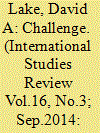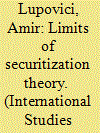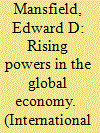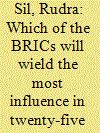|
|
|
Sort Order |
|
|
|
Items / Page
|
|
|
|
|
|
|
| Srl | Item |
| 1 |
ID:
134496


|
|
|
|
|
| Summary/Abstract |
Economic and political power within the international system is becoming more diffuse. Nonetheless, China is today the principal challenger to the United States (Mansfield, this issue). The European Union (EU) remains an economic powerhouse, but is currently plagued by problems centering on the euro and the austerity Germany and the fixed exchange rate regime have imposed on the continent. Europe has also shown little interest in challenging the United States in past decades and, in fact, has been a stalwart supporter of American hegemony for nearly 70 years. Japan remains the world's third largest economy and fourth largest trader, and after decades of stagnation may finally be on the road to economic recovery. Yet, it too remains a supporter of continued American leadership. Brazil, Russia, and India have garnered much attention recently but still rank low on the scale of economic power, whether measured by GDP or trade (Mukherji, this issue). China is the world's second largest economy and largest trader. By any measure, it is the only country likely to overtake the United States in the near future, although its ability to do so is not a foregone conclusion. The distribution of international power may soon return to bipolarity.
|
|
|
|
|
|
|
|
|
|
|
|
|
|
|
|
| 2 |
ID:
134491


|
|
|
|
|
| Summary/Abstract |
What can the scholarship on global international organizations (IOs) tell us about the contributions of the executive head (EH) to organizational change? The empirics of IO studies frequently credit EHs with important changes, but these studies seldom consider EHs separate from the rest of the bureaucracy and thus make few theoretical claims about them. Consequently, it is difficult to assess whether this credit is warranted and why some heads are given more credit than others. This article argues that heads, such as World Bank President Robert McNamara and United Nations Secretary-General Dag Hammarskjold, were influential because they did not just channel state and bureaucratic demands but made political choices that contributed to organizational adaptation. To make this argument, it draws on sociological institutionalist and constructivist scholarship on IO and leadership to develop an analytical framework where IO adaptation is linked to the EH's performance of two tasks commonly associated with executive leadership: defining a strategic plan and mobilizing support to implement that plan. However, it adds that when environmental constraints are severe, the conventional “follower-oriented” mobilization strategies found in leadership studies are less viable. Instead, EHs can adopt an “opposition-oriented” one intended to prevent the opposition from mobilizing while incrementally implementing key reforms.
|
|
|
|
|
|
|
|
|
|
|
|
|
|
|
|
| 3 |
ID:
134492


|
|
|
|
|
| Summary/Abstract |
Global measurements have become foundational for understanding gender equality as well as for directing resources and policy development to address gendered inequalities. We argue in this article that attempts to quantify gender (in)equality globally have limited potential for successfully challenging gender hierarchies if compared to internationally agreed upon women's rights standards. To make this argument, we start by contrasting the general assumptions underlying the measurement approach with feminist scholarship on gender equality. Second, we examine nine key measures of global gender equality—the majority of which are produced by influential international organizations—and show that their focus on “countability” perpetuates a narrow and misleading understanding of gender (in)equality. Third, we present the CEDAW Convention and associated review process as an alternative to the measurement approach. The comparison highlights the need for evaluative tools that attend to the complexity and fluidity of gender norms and focus on context-specific agency to confront gender hierarchies.
|
|
|
|
|
|
|
|
|
|
|
|
|
|
|
|
| 4 |
ID:
134500


|
|
|
|
|
| Summary/Abstract |
India's behavior in the global economy has transformed considerably, consistent with its embrace of economic globalization and deregulation since 1991. Until then, India had practiced a type of economic engagement that Stephen Krasner (1985) characterized as structural conflict. Its capacity to tax citizens was dismal. Its trade as proportion of gross domestic product (GDP) hovered around 16% in the 1980s, impeding growth. And, economic resources were redistributed authoritatively rather than through trade. India, like many developing countries, was locked in economic conflict with the West until the 1980s. Since then, it has embraced global economic integration, contributing to surging economic growth. An economy that grew at an average of 3.5% between 1956 and 1975 has grown at more than 6% since 1980 and over 7% since 2004. India is one of the fastest growing economies in the world after China, and the gap between the two countries is shrinking.
|
|
|
|
|
|
|
|
|
|
|
|
|
|
|
|
| 5 |
ID:
134493


|
|
|
|
|
| Summary/Abstract |
Most discussions concerning how to evaluate theories make reference to empirical, methodological, logical, or normative criticisms. Less attention is given to how challenges in the theory itself affect the choice of cases. In this paper, I put forward the concept of observational criticism, which aims to trace biases in the empirical employment of a theory. While it overlaps with some of the criticisms mentioned above, observational criticism distinctly focuses on what we can learn about a theory through the prominence or absence of cases, or types of case, in the scholarship. To this end, I suggest a three-stage approach for this criticism and I demonstrate each of these stages, as well as the utility of this framework, through a consideration of securitization scholarship—and more specifically of how securitization studies have overlooked the case of securitization moves in Israel. I suggest that although the concept of securitization has generated a great many studies on various theoretical and empirical issues, and despite the prominence of security discourse and practices in Israel, securitization scholarship has tended to avoid studying the securitization processes of this country. Following this mode of criticism, I argue that securitization theory could be more easily implemented in the case of Israel by, among other things, further clarifying the meaning of securitization success and its duration.
|
|
|
|
|
|
|
|
|
|
|
|
|
|
|
|
| 6 |
ID:
134498


|
|
|
|
|
| Summary/Abstract |
The 2013 BRICS summit in Durban, South Africa, attended by the leaders of Brazil, Russia, India, China, and South Africa, produced a joint declaration that simultaneously heralded a new “BRICS Development Bank” and demanded the reform of existing “international financial institutions to make them more representative and to reflect the growing weight of BRICS and other developing countries” (eThekwini Declaration 2013). As they had at previous summits, the BRICS demanded reform of “the prevailing global governance architecture” that was conceived over six decades ago.
|
|
|
|
|
|
|
|
|
|
|
|
|
|
|
|
| 7 |
ID:
134495


|
|
|
|
|
| Summary/Abstract |
Over the past 20 years, social scientists, government officials, and investors have expressed mounting interest in the BRIC countries, which include Brazil, Russia, India, and China.2 This acronym was originally coined in 2001 by a Goldman Sachs official who was concerned with the increasing role these countries were playing in global finance (Hounshell 2011). Recently, there has been a growing recognition that the effects of the BRICs on the global economy are not limited to finance. It is also clear that these countries are key political actors: all but one of them possess nuclear weapons, they are regional powers, and many observers view China as a potential challenger to the United States in global political-military affairs.
|
|
|
|
|
|
|
|
|
|
|
|
|
|
|
|
| 8 |
ID:
134494


|
|
|
|
|
| Summary/Abstract |
This article assesses the possibilities for the development of foreign-policy role theory using the concepts of traditions and dilemmas from the interpretive approach to foreign policy, as well as narratives as an interpretive method for analysis. While role theory is rich in conceptualization, it still suffers from overt structuralism, inattention to domestic processes of divergence/convergence affecting national roles, and from methodological underdevelopment. This article goes beyond studies of national role conceptions that present foreign-policy behavior as determined by the national role, thus making it possible to understand the interplay of competing voices in determining a national role, the processes of role change, and the resulting reorientation of foreign policy. This article illustrates the possibilities and limitations of merging role theory and the interpretive approach through the study of Chile's and Mexico's attempts to join the Asia Pacific Economic Cooperation (APEC), their accession to APEC, and their performance once accepted into APEC.
|
|
|
|
|
|
|
|
|
|
|
|
|
|
|
|
| 9 |
ID:
134497


|
|
|
|
|
| Summary/Abstract |
Are the BRICs driving a fundamental transformation of the world economy? Journalists, investors, policymakers, and academics alike prognosticate about the global impact of these large emerging economies. One camp deems the rise of the BRICs a challenge to America's hegemonic power, increasing global politico-economic instability as a result. Another camp defends the continuation of the American (and thereby, global) status quo with equal fervor. The BRICs, they argue, are mired in their own domestic challenges, mistrust one another, have little interest in leading global affairs, and have yet to command true followership by the rest of the developing world.
|
|
|
|
|
|
|
|
|
|
|
|
|
|
|
|
| 10 |
ID:
134499


|
|
|
|
|
| Summary/Abstract |
Edward Mansfield (this issue) offers a twofold appraisal of the significance of rising powers—defined here as the BRIC countries—for the study of international political economy (IPE). On the one hand, current approaches in IPE suffice to explain the behavior of rising powers since none threatens the present architecture of the global economy or the positions of the United States and European Union (EU). On the other hand, one rising power, China, has managed to surpass the others in military and economic capabilities, warranting a closer examination of the linkages between political economy and national security. While this view seems eminently reasonable, I argue that forecasting the relative material capabilities of the BRICs over a longer period, say over the next quarter century, requires stretching the boundaries of IPE to pay close attention to incremental changes in demographic patterns and in the geographic distribution of vital resources. Such factors are difficult to capture in the ontologies of conventional IPE theories; yet, over the long run, they may well determine the upper limits for a rising power's capabilities in the global economy. With this in mind, I offer the following tentative proposition: Russia is the BRIC country with the best prospects for boosting both its global economic clout and its population's living standards over the next quarter century.
|
|
|
|
|
|
|
|
|
|
|
|
|
|
|
|
|
|
|
|
|